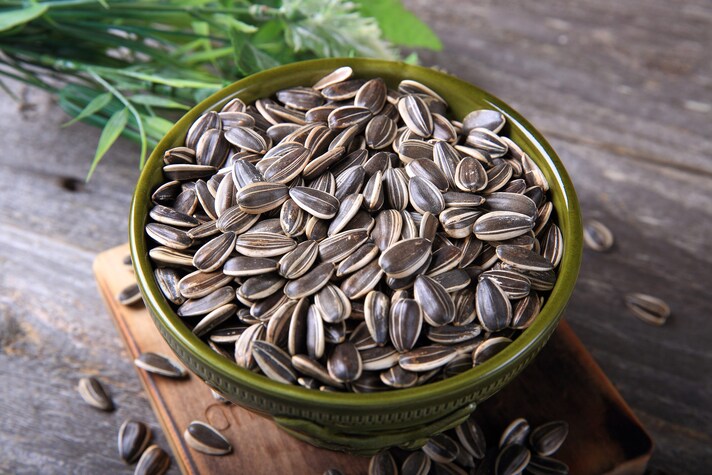
Following a healthy and balanced diet helps our body to stay fit and above all healthy: we know that an unregulated and fat-rich diet can shorten our life expectancy by promoting the development of chronic, intestinal or cardiovascular diseases. Knowing the foods that can lengthen our lives and that are real natural medicines is very simple and you will be surprised to know that three foods are enough to live a really long life. We are talking about legumes, seeds and nuts: simple and “poor” foods, rich in beneficial properties and very easy to find. Let's discover everything there is to know about these three precious allies of our health.
1. Seeds

Very small but rich in proteins, "good" fatty acids and vegetable fibers that help the regularity of our intestines: the seeds are antioxidants and have a natural detoxifying effect on our body. Excellent as a snack to calm down hunger, used to enrich your dishes from breakfast to salads, we can easily find different types of seeds on the market:
Flax seeds: don't let the size fool you, flax seeds are the natural food with the highest concentration of Omega3; they are rich in antioxidants, magnesium and phosphorus, promote the regularity of the digestive system and help our immune system. Consuming them every day, in the form of oil or in our recipes, is a healthy habit that allows us to take care of our body and increase our life expectancy.
Pumpkin seeds: they extend our life by protecting and strengthening the immune system, pumpkin seeds are rich in zinc, Omega3 and antioxidants; they naturally lower the level of cholesterol in the blood and also favor a good night's sleep which we know to be fundamental for our health.
Sunflower seeds: considered as simple snacks, these small seeds are actually rich in vitamin E, copper and folic acid; they help prevent cardiovascular diseases and have a detox effect on our intestines.
Sesame seeds: excellent for keeping the liver in shape, they are a natural source of calcium, magnesium, zinc and vegetable fibers. Why consume them every day? They fight cholesterol, and naturally prevent diseases such as osteoporosis or arthritis.
Chia seeds: very similar in flax seed composition, these little friends are rich in calcium, vegetable fibers, antioxidant proteins. Chia seeds are also excellent allies of those who follow a low-calorie diet and want to lose excess weight, as well as naturally regulating blood sugar levels.
2. Legumes

The benefits of legumes are practically endless: in addition to being excellent and rich in flavor, legumes are a source of natural proteins and antioxidant properties; they fight annoying problems of constipation, they help the regular elimination of cholesterol thanks to the presence of lecithin, they favor the intake of fats and sugars and, last but not least, they involve a sense of satiety which makes them perfect for any type of preparation. Always considered a natural meat substitute for the large amount of protein, if consumed with whole and non-whole grains, legumes provide a balanced supply of carbohydrates, amino acids and nutrients that help us live better and longer. Among the most common we can find:
Beans: they contain a large amount of carbohydrates and proteins (100grams of boiled beans contain about 8grams of protein and 17grams of carbohydrates), have a reduced fat content and the skin is rich in fibers that help the regular intestinal function. In poor diets they have always replaced meat but not everyone knows that if taken regularly and combined with cereals, beans are an inexhaustible source not only of proteins but also of vitamins A, B, C, iron, phosphorus and potassium. In nature we can find numerous types of beans: the black ones, more than others, are rich in fiber: excellent for winter soups.
Chickpeas: precious allies to control the level of cholesterol in the blood and to reduce the risk of diabetes, chickpeas are rich in calcium, iron, sodium, potassium and zinc. The large amount of fiber makes chickpeas excellent foods to regulate intestinal function while fatty acids help the cardiovascular system and allow us to reduce the risk of strokes and heart attacks.
Lentils: yellow, orange or hulled, lentils are excellent liver allies, reduce the triglycerides level and "bad" cholesterol, and they also help regular bowel function and regulate blood pressure due to the high presence of potassium. If taken at least once a week, lentils are antioxidants and detoxifiers for our body (also recommended in detox diets), rich in mineral salts and calcium, they help us to feel fit, prevent colon and intestinal diseases and live longer.
Peas: rich in water, mineral salts and proteins, peas are rich in carbohydrates (about 80grams per gram of raw product), very simple to digest and allies of our intestines against annoying problems of constipation. Consumed regularly, peas help prevent gastrointestinal and cardiovascular diseases thanks to folic acid which acts as a natural anticoagulant.
3. Walnuts

Walnuts are very rich in Omega3 and unsaturated fats that help circulation, reduce cholesterol and with it the possibility of developing cardiovascular diseases. Unsaturated fats naturally help our heart, protecting it from possible heart attacks and, together with protein intake and antioxidant values, make walnuts a healthy snack to take with you at any time of the day. There are many legends about these small nut foods, one of all advises us, to live long and healthy, to consume 5 or 6 nuts a day: folic acid and antioxidant properties help keep under control the development of free radicals and even help the mood.
;Resize,width=767;)
